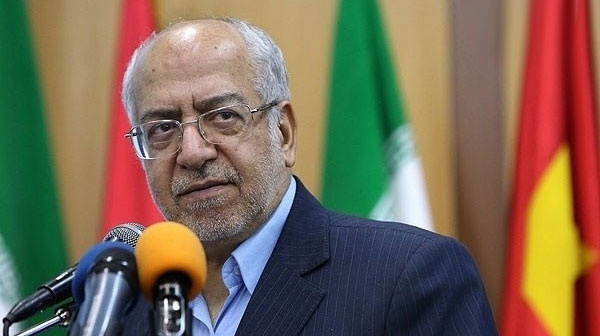Changing Course on Economy in Iran

On October 13, Iran’s parliament approved the July 14 nuclear deal, known as the Joint Comprehensive Plan of Action (JCPOA), and the Council of Guardians granted final approval a day later. The parliament proceedings were heated. One member of parliament had a heart attack and was taken to hospital. Another threatened Foreign Minister Javad Zarif and the head of Iran’s Atomic Energy Organization Ali Akbar Salehi, who were attending the proceedings, with death.
Outside the chamber the reception to the removal of the last legal obstacle to the historic deal between Iran and the West was decidedly cold. The public had anticipated economic improvements to continue into President Hassan Rouhani’s second year and after the signing of JCPOA. But the opposite has happened: the economy seems to be doing worse than last year.
Much of the public’s disenchantment with JCPOA was due to unrealistic expectations. Iran’s middle class expected a cheaper dollar and lower prices at the grocery store, but these were never in the cards. The dollar is still undervalued and becoming more undervalued by the month as Iran’s inflation continues to exceed the inflation of its trading partners. Lower consumer prices will not happen. Single-digit inflation is all that Iranian consumers can hope for, and that’s what Rouhani has promised.
Frustrating the public’s expectations has been a 10% rise in the dollar since July, consumer prices that continue to increase (albeit at less than half the rate two years ago), and a Tehran stock exchange that continued the slide it began a month after the initial agreement was signed.
As the anticipated economic benefits of JCPOA diminish, Rouhani is finding it more difficult to ask the public’s patience for continued austerity. As a result, he has decided to change course.
Gloomy Forecasts
A year after declaring the recession over, President Rouhani conceded earlier this week that the economy may experience negative growth this year and promised to unveil a new set of policies to prevent the recession from becoming a double-dip.
On October 5, following its Article IV Consultations in Tehran, the IMF released a somber report on Iran’s economy, allowing that growth could be negative in the current Iranian year that ends on March 20, 2016. The report is, however, upbeat overall, noting that the benefits of the JCPOA should push economic growth to a healthy 5% next year and beyond.
A much gloomier forecast came from four senior members of Rouhani’s own cabinet. In an unusual letter addressed to the president, dated September 9 but made public last week, the ministers warned of the potential for “the recession to turn into a crisis.” Three of the signatories—ministers responsible for the economy, labor, and industry—have reasons to be concerned about the fate of the economy. The signature of the fourth minster, for defense, gave the word “crisis” an ominous meaning.
Rouhani appears to have heeded the warning. This week he announced a new expansionary package to fight the recession.
The quarterly report of industrial production published by the Statistical Center of Iran issued last month—for establishments with more than 10 employees—showed a 2% drop for the spring quarter of 2015. With news of inventory build-up in large establishments, particularly the auto industry, the index will likely remain in the negative for the remainder of this year. Minister for Industries, Mines, and Trade Mohammad Reza Nematzadeh, a signatory to the letter and himself a successful industrialist, feels industry’s pain.
The Minister for Cooperation, Labor, and Welfare Ali Rabii, a self-proclaimed champion of the working class, has obvious reasons to be concerned. There is no indication that anything done on the economic front so far has made any difference in employment, especially for youth, whose unemployment rate stands at 25% (more than 40% for women). The Band-Aid solution to youth unemployment—to double enrollment in universities under Ahmadinejad—is about to bring millions of new university graduates into the job market.
Discord in the Coalition
No one doubts the facts behind the minsters’ concerns. What has perplexed analysts is why they had to write a letter to make their point. Presumably they have ample opportunity to communicate their perspectives in private.
The letter is thus more likely a sign of discord in the cabinet over economic policy. Rouhani’s cabinet, like his economic team, has been from the beginning an uneasy combination of right-leaning moderates identified with former president Hashemi Rafsanjani and left-leaning reformists loyal to former president Mohammad Khatami.
For now, Rouhani seems to have responded to the pressure from the left. On Tuesday, the same day that the parliament approved JCPOA, he went on national TV in the evening to promise that his economic policies will shift to focus on stimulating demand by, among other things, reducing the reserve requirements of banks and increasing government spending on development projects, presumably by printing money.
Given the economy’s highly anemic response to JCPOA, replacing austerity with expansionary policies and identifying unemployment rather than inflation as the enemy number one are good moves from an economic point of view. Meanwhile, from a political point of view, keeping together Rouhani’s uneasy coalition between moderates and reformists as the parliamentary elections in February approach is a must.
*Djavad Salehi-Isfahani conducts research on the economics of the Middle East and is currently a professor of economics at Virginia Tech. He is a nonresident senior fellow at the Brookings Institute and is also serving as the Dubai Initiative fellow at the Belfer Center for Science and International Affairs at Harvard University's John F. Kennedy School of Government. This fall he is the Kuwait Foundation Visiting Scholar at the Belfer Center of Harvard Kennedy School. He has served on the Board of Trustees of the Economic Research Forum (2001-2006), a network of Middle East economists based in Cairo.

